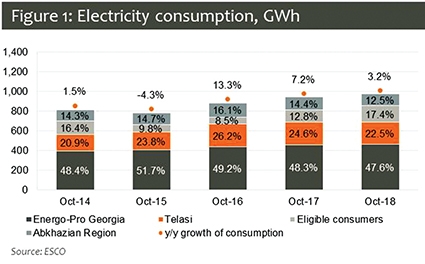Electricity Market Watch
Sector research is one of the key directions of Galt & Taggart Research. We currently provide coverage of Energy, Healthcare, Tourism, Agriculture, Wine, and Real Estate sectors in Georgia. As part of our energy sector coverage, we produce a monthly Electricity Market Watch, adapted here for Georgia Today’s readers. Previous reports on the sector can be found on Galt & Taggart’s website - gtresearch.ge.
Grid Code for Electricity updated
GNERC updated Grid Code for Electricity on October 26, 2018 to include requirements of Energy Community’s regulation No 543/2013 concerning submission and publication of data in electricity markets. This update is one step forward to implement Georgia’s obligations under the Energy Community. The Grid Code sets general rules for gathering, submission and publication of information on the European Network of Transmission System Operators for Electricity’s platform (ENTSO-E). The mentioned information includes: actual and forecasted loads, planned and emergency maintenance, grid congestions, NTCs, etc. The dispatch licensee - Georgian State Electrosystem (GSE) - is responsible for the data gathering and publication process and should prepare detailed instructions by April, 2019 and start publication by November, 2019.
Annual forecast for 2018 electricity balance revised
MoESD revised the annual balance of electricity in November 2018. The forecast for annual electricity consumption growth for 2018 was revised downwards from 9.9% to 8.2% in November 2018. The high expectation for annual growth was caused by 11.8%y/y increase in consumption during May-July period. Since August 2018, the growth of consumption slowed down to average 2.6% y/y. As a result, consumption forecast was revised to follow the trend. Actual electricity consumption was up by 6.9% y/y and reached 7.4 TWh in 10M18.
Updated annual balance of electricity also includes updated forecast of supply for November and December and actual figures for 10M18. According to updated balance, the import in 2018 is expected at last year’s record level of 1.5TWh. The record high electricity import in 2017 was caused by Enguri’s closure in winter reducing supply and 2018 import forecast is explained by increased electricity consumption.
Electricity consumption and generation – October 2018
Electricity consumption increased by 3.2% y/y in October 2018. The growth was driven by increased consumption of direct consumers (+40.5%y/y), as new companies were added to the group of eligible consumers, in line with legal changes effective since May 2018.
Consumption by distribution licensees was down by 0.7% y/y in October 2018, caused by above-mentioned reallocation of eligible consumers. The addition of new commercial and household subscribers to the group was not sufficient to fully absorb the mentioned reallocation effect, especially for Telasi.
Growth in demand coupled with a drop in domestic supply created increased need for electricity imports in October 2018. Electricity imports were up by 46.1% y/y and accounted for 22.7% of total electricity supplied to the grid. An 87.8% of imports came from Azerbaijan, while rest was imported from Turkey (under terms of ESCO’s barter agreement).
Domestic supply was down 5.5% y/y as hydro generation decreased by 0.8% y/y and thermal generation reduced by 17.2% y/y in October 2018. Increased generation of Enguri/Vardnili (+21.6%y/y) was not sufficient to compensate the drop in deregulated (-18.1%y/y) and other regulated (-8.3%y/y) HPPs, mainly caused by unfavorable hydrological conditions.
The guaranteed capacity fee was down by 3.8% y/y to USc 0.72/kWh in October 2018. All TPPs provided guaranteed capacity for entire month (except 1 day for Mtkvari Energy)
Electricity prices in Georgia and Turkey
Wholesale market prices in Georgia decreased 4.3% y/y to USc 5.3/kWh in October 2018. A 31.8% of total electricity supplied to the grid was traded through the market operator (ESCO), with the rest traded through bilateral contracts.
Average price of electricity imports to Georgia was slightly down (-2.7% y/y) to USc 5.1/kWh in October 2018.
Turkish electricity prices increased by dramatic 91.8% y/y in TRY terms, but in US$ terms price was up by 19.8%, the result of TRY’s depreciation since August 2018. Generally, Turkey’s energy sector is highly sensitive to FX movements and is anchored to US$. In October 2018, average electricity prices in Turkey reached US$ 5.5/kWh.
For Georgia Today by Mariam Chakhvashvili











